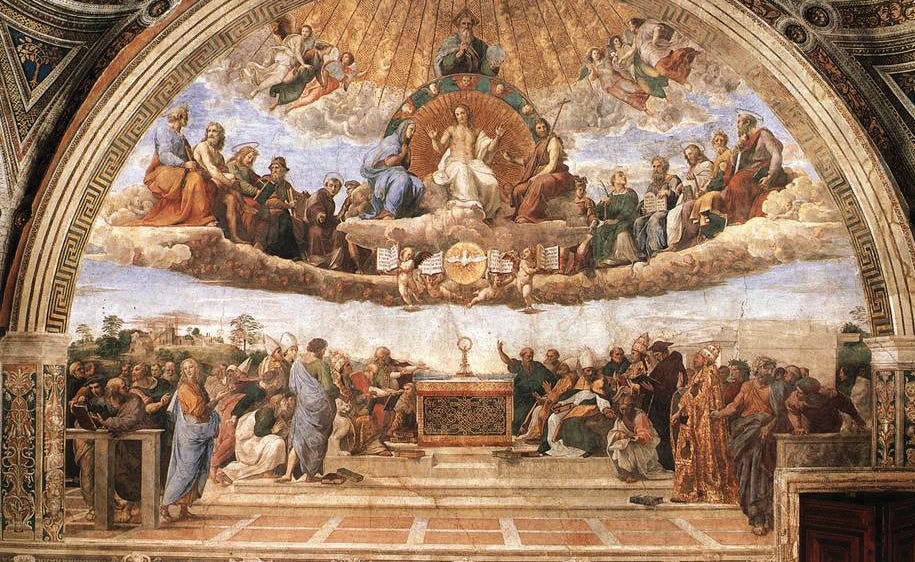Near the end of the Apostles Creed, we read the phrase the ‘Communion of the Saints’. For this to be included in the Creed, it means this is a key doctrine of Christianity.
Christian denominations see this phrase in two main ways:
The Roman Catholic Church, the Orthodox Churches and the traditional Protestant Churches recognise the Church Militant, those Christians on Earth and the Church Triumphant, those saints who have died. They believe they are in active communion with one another.
The rest of the global church tends to see this phrase associated with the Great Cloud of Witnesses as mentioned in the Book of Hebrews.
Hebrews 12 v 1
Therefore, since we are surrounded by such a great cloud of witnesses, let us throw off everything that hinders and the sin that so easily entangles.
They understand that the saints, the former Christians, are looking on them from Heaven, cheering them on. But the veil of death prevents them from engaging any further. I find this view difficult as Christ defeated death.
2 Timothy 1 v 10
But now has been revealed by the appearing of our Saviour Christ Jesus, who abolished death and brought life and immortality to light through the gospel,
However, due to my Modernist Protestant roots, I equally find the traditional idea slightly uncomfortable too.
The Kingdom of Heaven
A while ago, I wrote an article about where the Kingdom of Heaven. You can read it here. In it, I argue the Kingdom of Heaven is not only in Heaven, but also on Earth. Its boundary stretches from the Throne of God to the heart of every Christian. Once we submit to Christ, we become a subject of God’s Kingdom.
When a Christian dies, they remain in Christ. They continue to be subjects in the Kingdom of Heaven. The Body of Christ is the only organisation which transverses the barrier of death. Dying doesn’t remove your position as a follower of Christ.
So death does not stop someone from remaining my Christian brother and sister. And as they are still alive in Christ, they remain active in Him, continuing to exist within the Kingdom of Heaven.
So if this is true, how do we engage with these saints?
Praying to the Saints
This is a part of traditional Christianity which nearly all Modernist Protestants struggle with. However, if we believe that the saints are still alive in Christ, then as the Body of Christ we are still connected with them.
When we look at the history of the church, we read stories where a saint has appeared to a Christian on Earth. When Christians have asked a saint to intervene, a prayer has been answered or even a miracle has happened.
Traditional Christians argue that they do not pray to the saints or worship them, but ask them as a fellow followers of Christ to join them in their prayers. It is believed that as they are in Heaven, they can pray more appropriately, as they are closer to Christ.
The Modernist Protestants argue that as the saints are dead, they cannot hear any request for prayers and this is a wasteful endeavour. But the historical evidence causes me to doubt this.
The Bible is pretty much silent with regard to asking saints with Christ to pray for those on Earth. However, tradition shows it was engrained into the teachings of the early Church. Even to the point of including the Communion of the Saints in the Apostles Creed.
Inspiring Stories
Another way we can engage with the Communion of the Saints is to read their lives. There are thousands of biographies or hagiographies of the saints. There are even podcasts like the Manly Saints Project. They tell us how Christians have lived out their lives in different eras of the World.
Full Strength Christianity and the Saints
I believe a full strength Christianity needs to include the ‘Communion of the Saints’. After all, it is in the Apostles Creed. This may be uncomfortable for some Modernist Protestants, but they do not have to reject all of the views of the traditional churches.
If asking the saints to pray for us is too far, then why not read about the stories of their lives. And allow them to inspire you.
I would also encourage the traditional Christians to show grace to Protestants who are firmly against the practice of veneration. It isn’t a first order issue which will impact their salvation. As I’ve thought more about the Communion of the Saints, I have found myself move to a position where I firmly believe death has lost its sting and we can never be separated from Christ and His Body, the Church.
Romans 8 v 38-39
For I am convinced that neither death nor life, neither angels nor demons, neither the present nor the future, nor any powers, neither height nor depth, nor anything else in all creation, will be able to separate us from the love of God that is in Christ Jesus our Lord.
And now, I am more tentatively open to asking the saints to pray for us. Especially in this very dark time we live in.





Amen, Brother. When can prayer from a loving soul ever be inappropriate?
I returned to the Catholic church a few years after attending protestant churches for about a decade. I found many holes in protestant teachings and this was one of them. I do not judge, nevertheless. Thank you for writing this. I am glad you are helping to bridge the gap.